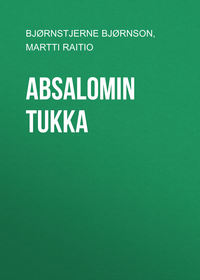 полная версия
полная версияThree Comedies
Nordan. Oh, you goose! You great goose!
Svava. You must come and talk to me!
Nordan. Isn't that what I am here for?
Svava. And I thought you were up in the mountains and could not hear from us.
Nordan. So I was. But when I got telegram after telegram, as long as they could reach me, and then one express letter after another—and now the end of it all is—well, I don't suppose I dare even mention his name here now? (RIIS comes in from his room.)
Riis. At last! We have been so anxious for you to come!
Mrs. Riis (who has at last risen and come forward). Thank you for coming, dear doctor!
Nordan (looking at her). There is something serious up, then?
Mrs. Riis. I have something I want to say to you.
Nordan. Yes, but just now away you go, you two! Let me talk to this booby. (MRS. RIIS goes out to the left. SVAVA follows her for a minute.)
Riis. I just want to tell you that in a little while—
Nordan.—the whole pack of Christensens will be here? I know that. Go away now.
Riis. Nordan! (Whispers to him.)
Nordan. Yes, yes!—Quite so!—No, of course not! (Tries to stop his whispering.) Do you suppose I don't know what I am about? Be off with you! (SVAVA comes in, as her father goes out.)
Svava. Dear Uncle Nordan! At last, somebody that will agree with me!
Nordan. Am I?
Svava. Oh, Uncle Nordan, you don't know what these days have been like!
Nordan. And the nights too, I expect?—although, with all that, you don't look so bad.
Svava. The last night or two I have slept.
Nordan. Really? Then I see how things stand. You are a tough customer, you are!
Svava. Oh, don't begin saying a lot of things you don't mean, uncle.
Nordan. Things I don't mean!
Svava. You always do, you know. But we haven't time for that now. I am all on fire!
Nordan. Well, what is this you have been doing?
Svava. Ah, you see, you are beginning again!
Nordan. Beginning again? Who the devil has put the idea into your head that I ever say anything but what I mean? Come and let us sit down. (Brings a chair forward.)
Svava (bringing her chair close to his). There now!
Nordan. Since I was here last, I believe you have promulgated a brand-new law on the subject of love? I congratulate you.
Svava. Have I?
Nordan. A superhuman, Svava-woven one—derived from seraphic heights, I should imagine! "There shall be only one love in a man's life, and it shall be directed only to one object." Full stop!
Svava. Have I said anything like that?
Nordan. Is it not you that have thrown over a young man because he has had the audacity to fall in love before he saw you?
Svava. Do you take it in that way, too?
Nordan. In that way? Is there any other way for a sensible man to take it? A fine young fellow honesty, adores you; a distinguished family throw their doors wide open to you, as if you were a princess; and then you turn round and say: "You have not waited for me ever since you were a child! Away with you!"
Svava (springing up). What, you too! You too! And the same talk! The same stupid talk!
Nordan. I can tell you what it is; if you do not give consideration to everything that can be said on the other side, you are stupid.—No, it is no use going away from me and marching up and down! I shall begin and march up and down too, if you do! Come here and sit. Or daren't you go thoroughly into the question with me?
Svava. Yes, I dare. (Sits down again.)
Nordan. Well, to begin with, do you not think there must certainly be two sides to a question that is discussed by serious men and women all over the world?
Svava. This only concerns me! And as far as I am concerned there is only one side to it.
Nordan. You do not understand me, child! You shall settle your own affairs ultimately, and nobody else—of course. But suppose what you have to settle is not quite so simple as you think it? Suppose it is a problem that at the present moment is exercising the minds of thousands and thousands of people? Do you not think it is your duty to give some consideration to the usual attitude towards it, and to what is generally thought and said about it? Do you think it is conscientious to condemn in a single instance without doing that?
Svava. I understand! I think I have done what you are urging me to do. Ask mother!
Nordan. Oh, I daresay you and your mother have chattered and read a lot about marriage and the woman question, and about abolishing distinctions of class—now you want to abolish distinctions of sex too. But as regards this special question?
Svava. What do you consider I have overlooked?
Nordan. Just this. Are you right in being equally as strict with men as with women? Eh?
Svava. Yes, of course.
Nordan. Is it so much a matter of course? Go out and ask any one you meet. Out of every hundred you ask, ninety will say "no"—even out of a hundred women!
Svava. Do you think so? I think people are beginning to think otherwise.
Nordan. Possibly. But experience is necessary if one is to answer a question like that.
Svava. Do you mean what you say?
Nordan. That is none of your business. Besides, I always mean what I say.—A woman can marry when is sixteen; a man must wait till he is five-and-twenty, or thirty. There is a difference.
Svava. There is a difference! There are many, many times more unmarried women than men, and they exhibit self-control. Men find it more convenient to make a law of their want of self-control!
Nordan. An answer like that only displays ignorance. Man is a polygamous animal, like many other animals—a theory that is very strongly supported by the fact that women so outnumber men in the world. I daresay that is something you have never heard before?
Svava. Yes, I have heard it!
Nordan. Don't you laugh at science! What else we to put faith in, I should like to know?
Svava. I should just like men to have the same trouble over their children that women do! Just let them have that, Uncle Nordan, and I fancy they would soon change their principles! Just let them experience it!
Nordan. They have no time for that; they have to govern the world.
Svava. Yes, they have allotted the parts themselves!—Now, tell me this, Dr. Nordan. Is it cowardly not to practise what you preach?
Nordan. Of course it is.
Svava. Then why do you not do it?
Nordan. I? I have always been a regular monster. Don't you know that, dear child?
Svava. Dear Uncle Nordan—you have such long white locks; why do you wear them like that?
Nordan. Oh, well—I have my reasons.
Svava. What are they?
Nordan. We won't go into that now.
Svava. You told me the reason once.
Nordan. Did I?
Svava. I wanted, one day, to take hold of your hair, but you would not let me. You said: "Do you know why you must not do that?"—"No," I said.—"Because no one has done that for more than thirty years."—"Who was it that did it last?" I asked.—"It was a little girl, that you are very like," you answered.
Nordan. So I told you that, did I?
Svava. "And she was one of your grandmother's younger sisters," you said to me.
Nordan. She was. It was quite true. And you are like her, my child.
Svava. And then you told me that the year you went to college she was standing beside you one day and caught up some locks of your hair in her fingers. "You must never wear your hair shorter than this," she said. She went away, and you went away; and when, one day, you wrote and asked her whether you two did not belong to one another, her answer was "yes." And a month later she was dead.
Nordan. She was dead.
Svava. And ever since then—you dear, queer old uncle—you have considered yourself as married to her. (He nods.) And ever since the evening you told me that—and I lay awake a long time, thinking over it—I wanted, even when I was quite a young girl, to choose some one I could have perfect confidence in. And then I chose wrong.
Nordan. Did you, Svava?
Svava. Do not ask me any more about that.—Then I chose once again, and this time I was certain! For never had truer eyes looked in mine. And how happy we were together! Day after day it always seemed new, and the days were always too short. I dare not think about now. Oh, it is sinful to deceive us so!—not deceit in words, it is true, but in letting us give them our admiration and our most intimate confidences. Not in words, no—and yet, it is in words; because they accept all we say, and are silent themselves, and by that very fact make our words their own. Our simple-mindedness pleases them as a bit of unspoilt nature, and it is just by means of that that they deceive us. It creates an intimacy between us and an atmosphere of happy give-and-take of jests, which we think can exist only on one presupposition—and really it is all a sham. I cannot understand how any one can so treat the one he loves—for he did love me!
Nordan. He does love you.
Svava (getting up). But not as I loved him! All these years I have not been frittering away my love. Besides, I have had too high an ideal of what loving and being loved should be; and just for that reason I felt a deep desire to be loved—I can say so to you. And when love came, seemed to take all my strength from me; but I felt I should always be safe with him, and so I let him see it and gloried in his seeing it. That is the bitterest part of it to me now—because he was unworthy of it. He has said to me: "I cannot bear to see any one else touch you!" and "When I catch a glimpse of your arm, I think to myself that it has been round my neck—mine, and no one else's in the world." And I felt proud and happy when he said so, because I thought it was true. Hundreds of times I had imagined some one's saying that to me some day. But I never imagined that the one who would say it would be a man who—oh, it is disgusting! When I think what it means, it makes me ready to hate him. The mere thought that he has had his arms round me—has touched me—makes me shudder! I am not laying down rules for any one else, but what I am doing seems to me a matter of course. Every fibre of my being tells me that. I must be left in peace!
Nordan. I see that this is more serious, and goes deeper, than I had any suspicion of. None of them understand it that way, Alfred least of all. He is only hurt—distressed and hurt at the thought that you could distrust him.
Svava. I know that.
Nordan. Yes—well—don't take up such a high and mighty attitude! I assure you that is how it will appear to most people.
Svava. Do you think so? I think people are beginning to think otherwise.
Nordan. Most people will think: "Other girls forgive things like that, especially when they love a man."
Svava. There are some that will answer: "If she had not loved him, she might have forgiven him."
Nordan. And yet, Svava?—and yet?
Svava. But, uncle, do you not understand? I do not know that I can explain it, either; because, to do that, I should have to explain what it is that we read into the face, the character, the manner of the man we love—his voice, his smile. That is what I have lost. Its meaning is gone.
Nordan. For a while, yes—till you have had a breathing space.
Svava. No, no, no! Do you remember that song of mine, about the beloved one's image? that one always sees it as if it were framed in happiness? Do you remember it?
Nordan. Yes.
Svava. Very well—I cannot see it like that any longer. I see it, of course—but always with pain. Always! Am I to forgive that, because other girls forgive it? What is that they have loved, these other girls? Can you tell me that? Because what I loved is gone. I am not going to sit down and try to conjure it up in my imagination again. I shall find something else to do.
Nordan. You are embittered now. You have had your ideal thoroughly shattered, and as long as you are smarting from that it is no use reasoning with you. So I will only beg one thing of you—one single little thing. But you must promise me to do it?
Svava. If I can.
Nordan. You can. There are things to take into consideration. Ask for time to think it all over!
Svava. Ah!—mother has been writing to you!
Nordan. And if she has? Your mother knows what depends upon it.
Svava. What depends upon it? Why do you speak so mysteriously, as if we were not on secure ground? Aren't we? Father talks about giving up this place. Why?
Nordan. I suppose he thinks it will be necessary.
Svava. Father? On grounds of economy?
Nordan. Not in the least! No, but all the gossips in the place will be at you. What you propose to do is a regular challenge, you know.
Svava. Oh, we can stand criticism! Father has some queer principles, you know; but his own life—. Surely no one has any doubt about that?
Nordan. Listen to me, my child. You cannot prevent people inventing things. So be careful!
Svava. What do you mean?
Nordan. I mean that you ought to go for a stroll in the park and pull yourself together a little, before the Christensens come. Try to be calm; come in calmly, and request time to think it over. That is all you have to do! They will make no difficulty about that, because they must agree. Nothing has happened yet, and all ways are still open. Do as I ask!
Svava. I have thought it over—and you will never get me to do anything else.
Nordan. No, no. It is only a matter of form.
Svava. What? You mean something more than that, I know.
Nordan. What an obstinate girl you are!—Can you not do it then, let me say, for your mother's sake? Your mother is a good woman.
Svava. What will they think, if I come in and say: "Will you not give me time to consider the matter?" No, I cannot do that.
Nordan. What will you say, then?
Svava. I would rather say nothing at all. But if I absolutely must say something—
Nordan. Of course you must!
Svava. Well, I will go out now and think it over. (Turns to go, but stops.) But what you want can never be.
Nordan. It must be!
Svava (standing by the door). You said just now: "Your mother is a good woman." It sounded almost as if you laid stress on the word "mother"?
Nordan. Suppose I did?
Svava. Is father not that, too?
Nordan. Your father a good woman?
Svava. Why do you try to turn it off with a joke?
Nordan. Because it is serious, confound it all!
Svava. Can I not believe father—?
Nordan. Hush!
Svava. Father?—Is it possible that he too—? Do people say that? (NORDAN does not answer, and does not move.) Shameful! Impossible! I say it is impossible! (Rushes out. RIIS comes in from the right.)
Riis. What is the matter with Svava?
Nordan (coming forward). There was nothing else for it.
Riis. Nothing else for it? What do you mean?
Nordan. No, devil take it!—there was nothing else for it.
Riis. Quite so—but what?
Nordan. What do you say?
Riis. No, what were you saying—?
Nordan. What was I saying?
Riis. You said there was nothing else for it. You alarm me.
Nordan. Do I? Then you did not hear right. (Moves away from him.)
Riis. Didn't hear right? You were swearing about it too!
Nordan. That I certainly did not.
Riis. Very well then, you didn't. But how did you get on with Svava? Won't you answer me?
Nordan. How did I get on with Svava?
Riis. Why are you so preoccupied? Are things so bad, then?
Nordan. Preoccupied? Why should I be that?
Riis. You ought to know best. I was asking about Svava—how you got on with Svava—and I think I have the right to know.
Nordan. Look here, Riis.
Riis. Yes? (NORDAN takes him by the arm.) What is it?
Nordan. Did you see Svava?
Riis. Hurrying away out through the park? Yes. My dear chap, what was it?
Nordan. It was the Greek tragedy.
Riis. The Greek—?
Nordan. Only the name—only the name! Well, you know what the word means, don't you?
Riis. The Greek—?
Nordan. No, no—not "Greek," but "tragedy"?
Riis. Something mournful—?
Nordan. Far from it! Something amusing! It came to Greece with the worship of Dionysus, in whose train there was a goat—
Riis (draws his arm away). A goat? What on earth—?
Nordan. Yes, you may well be surprised—because it sang!
Riis. Sang?
Nordan. Yes—and is still singing, of course! And paints! There are pictures by him in every exhibition. And works in bronze and marble! Wonderful! And such a courtier as he is, too! It is he that designs ball-dresses and arranges entertainments—
Riis. Have you gone raving mad?
Nordan. Why do you ask that?
Riis. I am waiting patiently here till you have done talking such damned nonsense! We are accustomed to something of the sort when you are in one of those humours, but to-day I can't understand a blessed word of what you are saying.
Nordan. Don't you, my dear fellow?
Riis. Can you not tell me what my daughter said? Isn't it ridiculous that I cannot get that out of you! Now, briefly and intelligibly, what did she say?
Nordan. Do you want to know?
Riis. He asks that!
Nordan. She said she pitied all the innocent young girls that, generation after generation, disappear—
Riis. Where to?
Nordan. That is just it—where to? She said: "They are brought up in pious ignorance, and finally the unsuspecting creatures are wrapped up in a long white veil that they shall not be able to see distinctly where they are being taken to."
Riis. Now you are talking your mythology again. Am I not to—
Nordan. Be quiet! It is your daughter that is speaking. "But I will not do that," she said. "I will enter confidently into the holy estate of matrimony, and sit down by the hearth in the land of my fathers, and bring up children in the sight of my husband. But he shall be as chaste as I; for otherwise he stains my child's head, when he kisses it, and dishonours me."—There, that is what she said, and she looked so splendid as she said it. (A ring is heard at the bell.)
Riis. They are upon us! They are upon us! What in the world is going to happen? We are in a muddle of the most preposterous theories! The whole heathen mythology is buzzing round in my head! (Hurries to the door to meet MR. and MRS. CHRISTENSEN, whom MARGIT is showing in.) I am so happy to see you!—so very happy! But your son?
Christensen. We could not get him to come with us.
Riis. I am very sorry!—At the same time, I quite understand.
Christensen. I admire the beauty of this place afresh every time I see it, my dear sir!
Mrs. Christensen. This beautiful old park! I wanted once—. Oh, good morning, doctor! How are you?
Nordan. So, so!
Riis (to MARGIT). Please tell Mrs. Riis. And—oh, there she is. (MRS. RIIS comes in by the door at the left.) And tell Miss Svava.
Nordan. She is out in the park (pointing)—out that way. (Exit MARGIT.)
Riis. No, this way!—That's right! Go straight on till you find her.
Mrs. Christensen (who meantime has come forward with MRS. RIIS). I have been thinking so much about you the last day or two, my dear! What a tiresome business this is!
Mrs. Riis. Do you mind my asking if you knew anything about it before?
Mrs. Christensen. What is there that a mother—and a wife—escapes the knowledge of nowadays, my dear! She was in my service, you know. Come here! (Tells MRS. RIIS something in a whisper, ending with something about "discovery" and "dismissal.")
Riis (offering the ladies chairs). Won't you sit down?—Oh, I beg your pardon! I did not see—. (Hurries to CHRISTENSEN.) Excuse me, but are you really comfortable in that chair?
Christensen. Thank you, I am just as uncomfortable here as anywhere else. It is the sitting down and getting up again that bothers me more than anything else. (Looks round.) I have just been to see him.
Riis. Hoff?
Christensen. Honest fellow. Stupid.
Riis. So long as he holds his tongue—
Christensen. He'll do that.
Riis. Thank heaven for that! Then we have only ourselves to consider. I suppose it cost you a bit?
Christensen. Not a penny!
Riis. You got out of it cheap, then.
Christensen. Yes, didn't I? Still, as a matter of fact, he has cost me quite enough already—although he knows nothing about that.
Riis. Indeed? When he failed, I suppose.
Christensen. No, when he married.
Riis. Oh, I understand.
Christensen. And I didn't think I should hear any more about it after that.—You ladies seem to be having a fine game of whispering! (MRS. CHRISTENSEN comes forward. RIIS places chairs for her and his wife.)
Mrs. Christensen. I was telling Mrs. Riis about the Miss Tang affair. She really seems to have risen from her grave!
Christensen. Is your daughter at home, may I ask?
Riis. I have sent to fetch her.
Mrs. Christensen. I hope the last few days have taught her a lesson too, poor girl! She suffers from a fault that unusually clever people are very liable to—I mean self-righteousness.
Riis. Exactly! You are perfectly right! But I should call it arrogance!
Mrs. Christensen. I should not like to say that—but presumption, perhaps.
Mrs. Riis. Why do you say that, Mrs. Christensen?
Mrs. Christensen. Because of various conversations I have had with her. I was speaking to her once about a man's being his wife's master. In these days it is a good thing to impress that on young girls.
Christensen. Yes, indeed!
Mrs. Christensen. And when I reminded her of certain words of St. Paul's, she said: "Yes, it is behind those bars that we women are still shut up." Then I knew that something would happen. Pride goes before a fall, you know.
Christensen. Oh, come, come! That won't do at all! Your chain of reasoning isn't sound!
Mrs. Christensen. How?
Christensen. It is not. Because in the first place it was not Miss Riis that fell, but your precious son. And in the second place his fall was not a consequence of Miss Riis's pride, because of course it happened many years before Miss Riis showed any of her pride. So that if you knew that his fall would happen as a consequence of Miss Riis's pride, you knew something that you certainly did not know.
Mrs. Christensen. Oh, you are making fun of me!
Christensen. I ought to be at a committee meeting punctually at one.—May I ask what has become of your daughter?
Riis. Indeed I am really beginning to wonder—(During the foregoing, NORDAN has remained in the background, sometimes in the room and sometimes outside in the park. MARGIT now goes fast the window outside, and NORDAN is heard speaking to her.)
Nordan. Have you only just found her?
Margit. No, sir—I have been down once already to take Miss Riis her hat, gloves and parasol.
Nordan. Is she going out?
Margit. I don't know, sir. (Goes out.)
Christensen. Dear me!
Riis. What does it mean? (Turns to go and fetch her.)
Nordan. No, no! Do not you go!
Mrs. Riis. I expect I had better go—
Riis. Yes, you go!
Nordan. No, I will go. I am afraid I am responsible for—. (As he goes) I'll answer for it I will bring her back!
Christensen. Dear me!
Mrs. Christensen (getting up). I am afraid, my dear Mrs. Riis, we have come at an inconvenient time for your daughter?
Riis. Ah, you must be lenient with her! I assure you it is these high-flown ideas—this reading, that her mother has not been nearly firm enough in keeping her from.
Mrs. Riis. I? What are you talking about?
Riis. I say that this is a very important moment! And at moments like this one sees very clearly, very—well, that is what happens!
Christensen. Your husband, Mrs. Riis, has suddenly had the same sort of revelation as our parson had lately—I should say, my wife's parson. It was one day just after dinner—after an extremely good dinner, by the way—a moment when a man often has very bright ideas. We were talking about all the things a woman has to learn now, as compared with the old days, and how some people say it is mere waste of time because she will forget it all again when she marries. "Yes," said parson, looking very pleased, "my wife has completely forgotten how to spell; I hope she will soon forget how to write, too!"
Mrs. Christensen. You imitate people so well, that one cannot help laughing—although it isn't right. (CHRISTENSEN looks at his watch.)
Riis. It doesn't look as if they were coming back?—Will you go, or shall I?
Mrs. Riis (getting up). I will go. But you could not expect them already—









